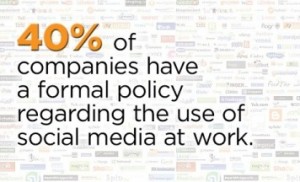22nd Mar 2012

As employees of a company, we are all accountable for how we speak about that company’s products, services, and operations, whether in person, on the phone, in print or online. The following sample Social Media Policy is a valuable employer reference when reviewing any company’s Employee Manual. The policy serves to remind employees that before they post information online that relates in any way to their employer, it pays to consider some guidelines. It also attempts to draw a line between protected speech and speech that could subject the employee to discipline or discharge.
OVERVIEW
“Social media” is also called “social networking,” but this Policy will use the term “social media” only. The purpose of this Policy is to provide guidance on the expectations of [Company Name] (the “Company”) regarding the use of social media by its employees in an appropriate manner.
While the Company respects your privacy and your right to free speech, you also have responsibilities when you voluntarily put information into the public domain. If you engage in conduct while using social media (as defined below) that violates the Company’s policies, you could be subject to disciplinary action up to and including termination, even if the conduct occurs off the Company’s premises or on your personal, non-work time.

According to two recent surveys from Technisource and its parent company, SFN Group.
DEFINITION OF SOCIAL MEDIA
Social media refers to activities that integrate technology, social interaction, and the sharing of words, pictures, videos, and audio, such as:
- multimedia and social networking sites like Myspace, Facebook, Twitter, flickr, and YouTube;
- social networking sites with an emphasis on professional exchange of information and development of business, such as LinkedIn;
- blogs, microblogs, wikis, message boards, social bookmarking Web sites, and other community-based sites or collaboration tools;
- social commerce postings, like product or experience reviews; and
- any other site where information (test, images, video, sound, or other files) can be uploaded or posted.

GUIDELINES
As employees of the Company, we are accountable for how we speak about the Company’s products, services, and operations, whether in person, on the phone, in print, or online. Before you post information online that relates in any way to the Company, become familiar with and consider the following guidelines.
Think before you “send.” Always remember to think about what you plan to say, and how you plan to say it, before composing information and sending it out via social media. Once your thoughts are “out there,” it is difficult, if not impossible, to take them back. Do not communicate information when you are excited or angry. You may not like what you sent when your mood has passed.
- Keep confidential information confidential. Any statement, whether made online or offline or though images, videos, or sound files, related to or referencing Company products, services, operations, customer, vendors, or other employees, regardless of the media or form used, must strictly comply with the Company’s practices, policies, and procedures. Keep any Internet-based conversation about the Company focused on publicly known information. If you are not sure whether something is appropriate to post, double-check what you have composed and get a second opinion from your supervisor before sending.
- Be accurate, truthful, and considerate in your posts. Be constructive, provide appropriate context, and think about the impact of your comments on our customers, vendors, other employees, and board members. Words matter, especially when employees discuss business-related topics. Anyone, including customers, vendors, competitors, your supervisor, and other Company employees can find and see postings put out in the public domain. Be thoughtful about what you share and how you share it—just as you would at home.
- Be respectful. Respect for others is mandatory. Do not use ethnic slurs, personal insults, or obscenity, or engage in any conduct that would not be acceptable in the workplace, at least where those comments relate to the Company in any way.
- No privacy exists. The Internet is fully searchable, which means that anyone with an Internet connection, including your co-workers, our customers, vendors and competitors can find even the most obscure information. Be careful about posting personal information online, whether it is information about you, other employees, or customers. Personal information can include photos, addresses and telephone numbers, information about where and when you work, or anything else that could compromise your safety or that of your team members or our customers.
- Possible legal ramifications. Remember that individuals can be held legally accountable for comments deemed to be defamatory, slanderous, libelous, obscene, or proprietary, whether they pertain to the Company, another organization, or an individual person.
- Identify yourself. You must make it clear that you are speaking for yourself and not on behalf of the Company. Speech that appears to represent the Company, even remotely, takes on the appearance of an official position statement and is not permitted in any circumstance. Use a personal e-mail address as your primary means of identification. You may use your Company e-mail to convey information on the Internet only in accordance with Company policy. The Company’s intellectual property, logos, trademarks, and copyrights may not be used in any manner.
- Communicating during working hours. While the Company does not prohibit minimal communication with friends and family during working hours, we expect you to use good judgment and not allow your social media activity to interfere with your work commitments, in accordance with Company policy.
For more information on Social Media Policies for your company, contact Michael Gibbons.
Written by Mike Gibbons
T: 248-282-1069


